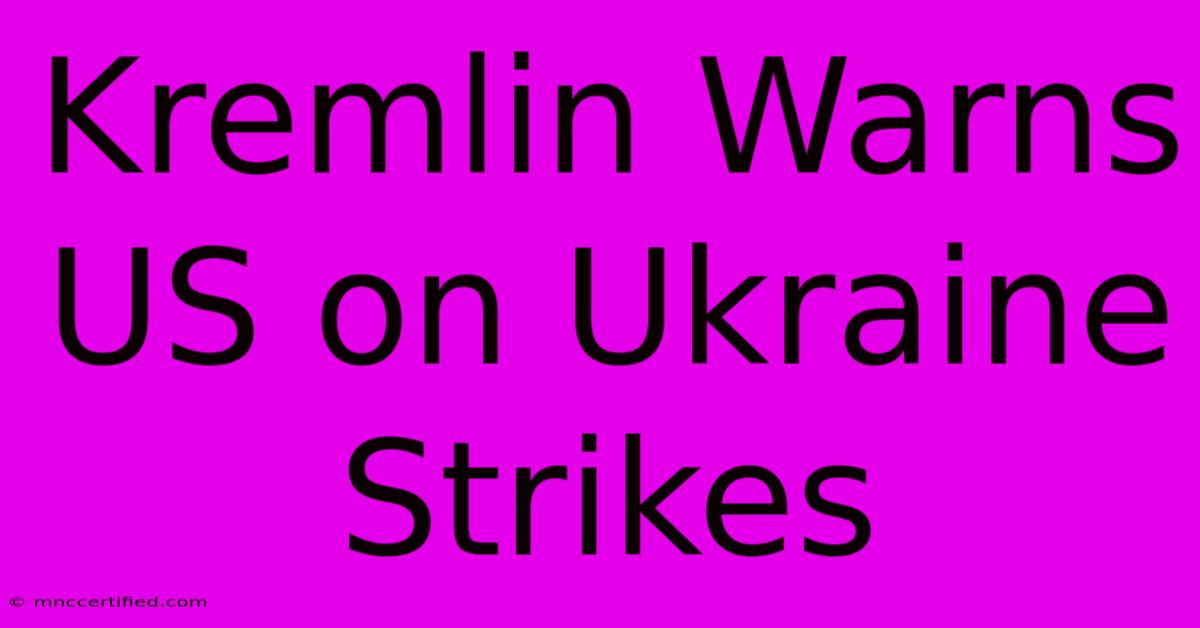Kremlin Warns US On Ukraine Strikes

Table of Contents
Kremlin Warns US on Ukraine Strikes: Escalation Fears Rise
The Kremlin has issued a stark warning to the United States regarding its involvement in the ongoing conflict in Ukraine, raising concerns about a potential escalation of the war. Recent developments, including increased military aid and intelligence sharing from the US to Ukraine, have prompted a strong response from Moscow. This article delves into the specifics of the Kremlin's warning, analyzes the potential consequences, and explores the broader geopolitical implications of the escalating tensions.
Specifics of the Kremlin's Warning
The Kremlin's warnings have been delivered through various channels, including diplomatic statements, press briefings, and carefully worded pronouncements by high-ranking officials. While the exact wording varies, the core message remains consistent: direct US involvement in Ukrainian strikes against Russian territory will be met with a forceful response. This warning extends beyond simply supplying weapons; it includes intelligence sharing that facilitates Ukrainian attacks.
The Kremlin views any action that could be interpreted as direct US participation in hostilities as a significant escalation. They emphasize the potential for such actions to dramatically alter the conflict's trajectory, leading to unforeseen and potentially catastrophic consequences. This highlights a crucial aspect: the Kremlin's perception of the line between providing support and direct involvement. The ambiguity surrounding this line is a key factor fueling the current tensions.
Key Concerns Highlighted by the Kremlin:
- Risk of direct military confrontation between the US and Russia: This is the most significant concern. A direct clash between the two nuclear superpowers would have devastating global implications.
- Further escalation of the conflict: The Kremlin argues that US involvement would inevitably lead to a wider war, potentially drawing in other nations.
- Undermining Russia's security interests: The Kremlin perceives US support for Ukraine as a direct threat to its national security and strategic interests.
Analyzing the Potential Consequences
The potential consequences of increased US involvement are multifaceted and far-reaching. A direct military confrontation remains the most alarming scenario. However, even short of direct conflict, several other severe repercussions are possible:
- Increased intensity of fighting in Ukraine: Further escalation could lead to more intense fighting, resulting in a higher number of casualties and greater destruction.
- Further destabilization of the region: The conflict's expansion could destabilize neighboring countries, potentially sparking regional conflicts.
- Global economic repercussions: An escalation would likely have severe repercussions on the global economy, impacting energy markets, supply chains, and global trade.
- Heightened international tensions: Increased US involvement would further strain relations between the US and Russia, exacerbating existing geopolitical tensions.
Geopolitical Implications
This situation significantly impacts the global geopolitical landscape. The conflict in Ukraine has already shaken the existing international order, and further escalation could lead to a more fragmented and unpredictable world. The potential for miscalculation and unintended escalation is high, underscoring the urgency for de-escalation efforts.
The Kremlin's warnings serve as a reminder of the high stakes involved in the Ukraine conflict. Navigating this complex situation requires careful diplomacy and strategic decision-making by all parties involved. The international community must work towards a diplomatic solution to prevent further escalation and mitigate the potential for catastrophic consequences.
Conclusion: The Need for De-escalation
The Kremlin's warning underscores the urgent need for de-escalation. Open communication channels, clear red lines, and a commitment to diplomacy are crucial to avoiding a catastrophic confrontation. The focus should shift towards finding a peaceful resolution that addresses the concerns of all parties involved. Ignoring the Kremlin's warning carries immense risks, highlighting the need for careful consideration and proactive diplomacy to navigate this precarious situation. The international community must actively work towards de-escalation to prevent the conflict from spiraling into a larger and more devastating war.
Keywords: Kremlin, Ukraine, US, Russia, military strikes, escalation, warning, geopolitical implications, conflict, international relations, diplomacy, de-escalation, nuclear weapons, security interests, military aid, intelligence sharing.

Thank you for visiting our website wich cover about Kremlin Warns US On Ukraine Strikes. We hope the information provided has been useful to you. Feel free to contact us if you have any questions or need further assistance. See you next time and dont miss to bookmark.
Featured Posts
-
Canyon Pacific Insurance Services
Nov 19, 2024
-
Does Boat Insurance Cover Sinking
Nov 19, 2024
-
Kremlin Us Enabling Ukraine Attacks
Nov 19, 2024
-
Dentist Las Vegas Nv No Insurance
Nov 19, 2024
-
Life Insurance After Colon Cancer
Nov 19, 2024